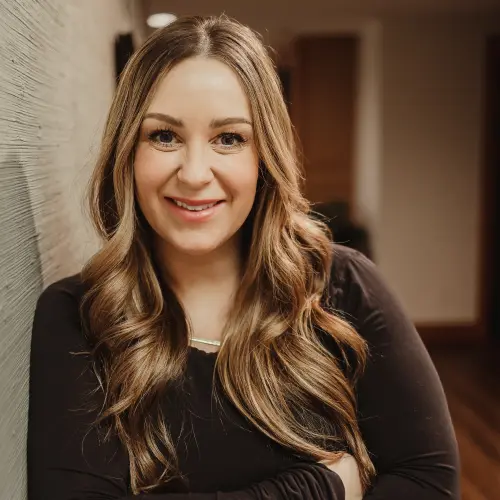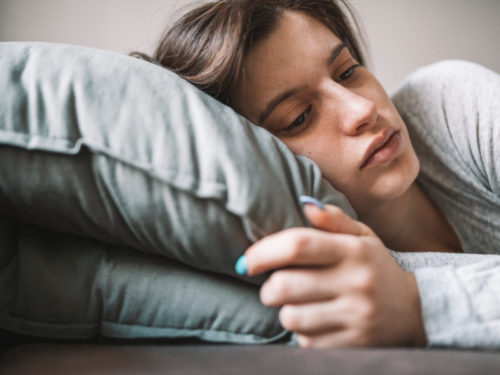
Table of Contents
Living with Bipolar Disorder

Written By: Amanda Lundberg

Clinically Reviewed By: Dr. Don Gasparini
May 30, 2023
8 min.
Charlie Health’s Co-Founder and Chief Clinical Officer, Caroline Fenkel, DSW, LCSW, discusses her personal experience of living with bipolar disorder and her passion for ending its stigma.
Learn more about our Clinical Review Process
Table of Contents
Living with bipolar disorder can be a complex journey, and finding the right support and resources is crucial to navigating this mental health condition.
At Charlie Health, our team develops tailored treatment plans that address the unique needs of every individual, including those living with bipolar disorder. This includes creating and implementing cutting-edge curriculum and programming, providing top-notch clinical care, and leveraging technology to make mental health support more accessible to all so that they can live their most fulfilled lives.
We spoke with Charlie Health’s Co-Founder and Chief Clinical Officer, Caroline Fenkel, DSW, LCSW, about her personal experience of living with bipolar disorder and her passion for ending its stigma.
Bipolar disorder 101
What is bipolar disorder?
Bipolar disorder is a mental health condition characterized by extreme shifts in mood, energy levels, and activity levels. These mood swings typically alternate between episodes of mania and depression and can last days, weeks, or even months.
Manic episodes involve elevated or irritable mood, increased energy, impulsive behavior, and decreased need for sleep. Depressive episodes, on the other hand, involve feelings of sadness, hopelessness, low energy, difficulty concentrating, and loss of interest in activities.
The mood swings experienced in bipolar disorder can be intense and disruptive, affecting a person’s daily functioning and quality of life. However, it’s important to note that bipolar disorder is a complex condition that involves much more than just moodiness. It’s a chronic illness that requires proper diagnosis, treatment, and ongoing management by a mental health professional.
Bipolar disorder is basically a cycle between those two things: mania and depression.
What are the differences between the different types of bipolar disorder?
People often think of “bipolar” as one universal diagnosis, but there are actually several different categories of bipolar disorder, each with significant differences from the others. The four main types are bipolar I, bipolar II, cyclothymic disorder, and unspecified bipolar disorder.
Bipolar I is the most severe form of bipolar disorder. Individuals with bipolar I experience manic episodes that last for at least seven days or are severe enough to require immediate hospitalization. Depressive episodes may also occur, lasting for at least two weeks. Some people with bipolar I disorder may also experience mixed episodes, which involve both manic and depressive symptoms simultaneously.
Bipolar II disorder is characterized by recurring episodes of major depression and hypomania, which is a less severe form of mania. Hypomania has symptoms that are shorter in duration and less impairing compared to the mania that presents in bipolar 1. While individuals with bipolar 2 disorder don’t experience full manic episodes, the depressive episodes can be severe and debilitating.
Cyclothymic disorder is arguably the least well-known subset of bipolar disorder. It involves numerous periods of hypomanic and depressive symptoms that are less severe and shorter in duration than those seen in bipolar 1 and 2 disorders (sometimes called “rapid cycling”). However, these symptoms are chronic and persist for at least two years in adults or for one year in children and teens.
Lastly, unspecified bipolar disorder is a categorization used when someone’s symptoms don’t fit the specific criteria for the aforementioned types. For example, a person may experience recurring hypomanic episodes without depressive episodes, or they may have fewer symptoms or symptoms that do not meet the duration criteria for a formal diagnosis.
How is bipolar disorder diagnosed?
One of the primary risk factors for bipolar disorder is family genetics, as this mental health condition is highly hereditary. Once a patient presents with symptoms associated with bipolar disorder, clinicians use a series of questions and assessments to determine if bipolar disorder is the most appropriate diagnosis. A mental health professional can pretty quickly decipher if someone is dealing with a true bipolar disorder or not.
What advice do you have for someone who thinks they might have bipolar disorder and is seeking help for the first time?
Just know that this is an extremely manageable diagnosis.
Once you start taking the right medications and find the right therapist, you’ll be able to live a very happy and fulfilling life. Some of the most creative people in the world have bipolar (like Demi Lovato and Mariah Carey!), and it does not mean something is wrong with you.
Living with bipolar disorder
What are some common misconceptions and stigmas about living with bipolar disorder?
I think that people don’t realize how effective medications are at managing bipolar. People think that if you’re bipolar, you’re always going to be in a manic episode or a depressed episode regardless of what meds that you’re on or what’s going on in your life. This simply isn’t the case if you’re receiving the proper treatment. Living with bipolar disorder can be challenging, but with the right support and resources, it is possible to manage the condition and live a fulfilling life.
Can you discuss your experience self-medicating and how this relates to your bipolar disorder?
Self-medicating is something we don’t discuss enough regarding bipolar disorder. I was a big substance user in high school and struggled pretty significantly with alcoholism and drug addiction. I believe that a lot of that was an attempt to self-medicate my bipolar disorder.
For example, I wanted to be high on marijuana constantly. I thought it would soothe the racing thoughts and the hypomania that I was experiencing. Then I was diagnosed with bipolar disorder and started getting professional support, which helped me stop self-medicating. There are probably a lot of people who are struggling with substance use who also have bipolar disorder. Generally, though, once their bipolar disorder is under control, they don’t feel the same need to turn to drugs and alcohol.
What are some effective coping strategies that you’ve used for managing the emotional highs and lows associated with bipolar disorder?
There are two different types of “arousal” (as in mood and energy levels) that can happen with bipolar: hypo-arousal, meaning that you are in a depressed state and nothing can get you going, and hyper-arousal, which is when any trigger puts you in a manic state.
A big part of coping is working through and finding out what works to help regulate your emotions and cycles. It’s helpful to write down a list of things that can help you regulate when you feel triggered.
For me, it’s going on a walk in nature or watching “The Office.” For someone else, it might be journaling or trying out a new recipe. The key is to look at what helps regulate me when I’m in a dysregulated state.
How can someone with bipolar disorder work with their healthcare team to develop a comprehensive treatment plan?
It’s really key to involve as many people as possible in the treatment process, including your spouse, siblings, parents…as big of a support system as possible.
Reflection helps as well. Noticing your feelings and triggers helps you better decide the healthiest course of action when your bipolar is feeling unmanageable or overwhelming.
People with bipolar also need major psychoeducation from a trained professional. This education will help them recognize, “I might be going into a different cycle right now. What are the tools and skills I have to deal with this? How can I ask for support?”
Medication is also an integral part of managing bipolar disorder. Charlie Health is very medication-conservative, but the reality is that when someone is diagnosed with bipolar disorder, the only way to get stable is by taking medications. There is usually a lot of trial and error in finding the medication that works for you specifically, similar to the treatment of many other mental health conditions.
Thriving with bipolar disorder
How can someone with bipolar disorder effectively communicate their needs and experiences to their loved ones?
Sharing articles and books about bipolar with loved ones can be helpful. I recommend, “An Unquiet Mind.”
Beyond just sharing resources though, sharing your vulnerability about living with bipolar can help build trust, empathy, and even more support.
Join the Charlie Health Library
Get mental health updates, research, insights, and resources directly to your inbox.
You can unsubscribe anytime.
How can someone with bipolar disorder establish a healthy routine to help maintain stability?
Interact with loved ones.
Maintaining social connections and avoiding isolation is of utmost importance for people with bipolar disorder. This can be as simple as having some kind of daily touchpoint with a loved one. Focusing on your nutrition, eating three healthy meals each day, and making sure that you focus on sleep hygiene are also important.
What role does therapy at Charlie Health play in the management of bipolar disorder?
For bipolar disorder specifically, it’s essential to meet with a therapist on a weekly basis who can very easily tell if your mood has shifted or changed. Think of them as being able to read your baseline. When it comes to stability and having a sounding board, therapy holds you accountable.
It can also help you process the reality that you’ve been diagnosed with a major mood disorder that you’re going to live with for the rest of your life, for which there is no cure. There can be a lot of grief and sadness with that. That’s why I’m so grateful for the work of our clinical team here at Charlie Health.
Charlie Health’s Intensive Outpatient Programming (IOP) consists of three hours of groups three days per-week, along with one hour of individual and one hour of family therapy each week. We have a psychiatry program as well. All of this contributes to a superb treatment option for people living with bipolar disorder.
I’m also really proud that we are uniquely positioned to treat people with bipolar disorder because of our evidence-based CBT programming. We focus on restructuring cognition around triggers and moods, which is the key to improving someone’s relationship with the diagnosis and symptoms.
We need to continue talking about this because education is the most effective way to end the stigma around bipolar.
–
Charlie Health is committed to providing comprehensive and accessible care for individuals with bipolar disorder. We want to thank Dr. Fenkel for sharing her journey with us today.





